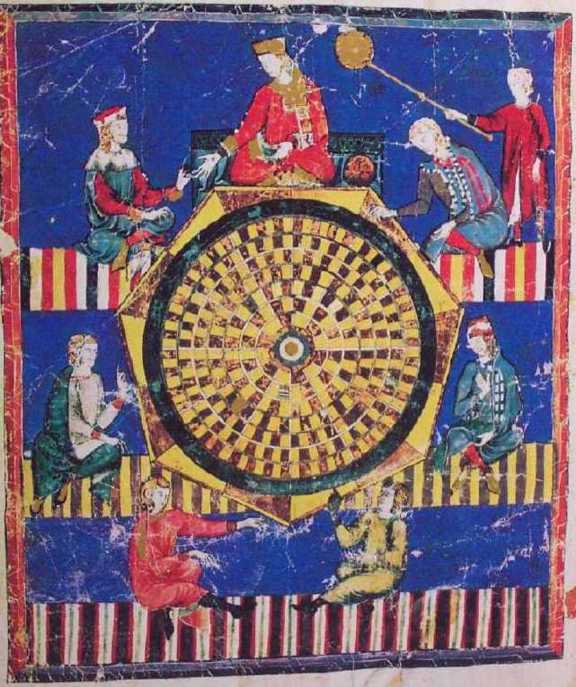
| Next Page | Previous Page | Bibliography | Links |
| Table 1
Introduction thru Chess Problem #15 |
Table 2
Chess Problems #16 to #50 |
Table 3
Chess Problems #51 to #89 |
Table 4
Appendix Other Games |
Los Escaques Called "Zodiac" in some modern books on the
history of games
F96V: Seven men playing this game
David Parlett in his "Oxford history of Board Games" points out that
this is misleadingly listed under the title "Los Escaques" (Chess) in the
MS. However, it appears to be a gambling game known as "al-falakiya" in
Arabic, or "Kawakib" (stars) in Iranian. Each player represents a planet,
and move with the rolls of a 7-sided die. Payments are made to the other
players based on the astronomical relationships formed with each move.
The starting position of each player's piece -his planet, is in the favorite
'house' of this planet: Saturn starts in Aquarius, Jupiter in Sagittarius,
Mars in Scorpio, the sun in Leo, venus in Taurus, mercury in Virgo and
luna, or the Moon in Cancer. Every planet starts in it's sign,or house
in the left most square.

- If the sign the planet enters, is at a Sextil to another sign, with another planet in it, the player whose move it is gets 2 counters from each player whose planet is in the said signs. A Sextil is a 60 degree distance, or the second sign before and after the sign the player is in.
- The player gets 3 counters from every planet at a Trigon from it, i.e. 120 degrees, or the fourth sign before and after the current sign of the player.
- The player has to give 3 counters to every planet at a Quadratur from him (90 degr., 3rd before and after).
- He equally gives 6 counters to every planet in Opposition to him (i.e. directly opposite the sign).
- He gives 12 counters to every planet in Conjunction to him, i.e. in the same sign as he is.
In short: You enter a sign. You get 2 conters from the 2nd before and after, you pay 3 to the 3rd, you get 3 from the 4th and you pay 6 to the one opposite and to the one in the same sign as you have entered.
(Another portrayal of the board scanned from "Chess
a Celebration of 2000 Years", 1989)
